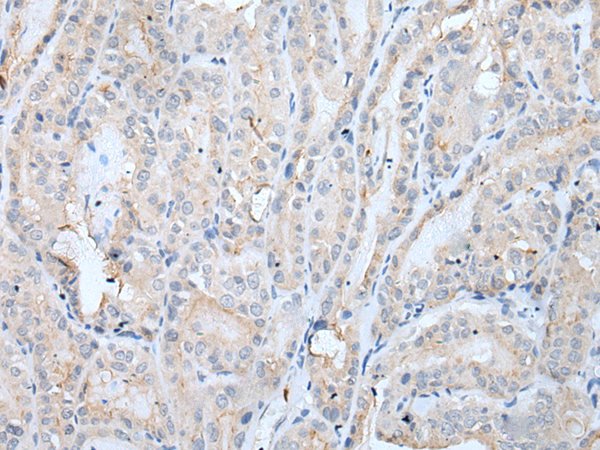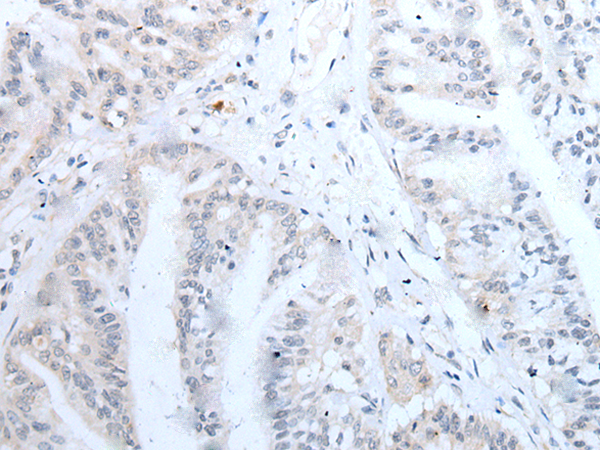

| WB | 咨询技术 | Human,Mouse,Rat |
| IF | 咨询技术 | Human,Mouse,Rat |
| IHC | 1/20-1/100 | Human,Mouse,Rat |
| ICC | 技术咨询 | Human,Mouse,Rat |
| FCM | 咨询技术 | Human,Mouse,Rat |
| Elisa | 1/5000-1/10000 | Human,Mouse,Rat |
| Aliases | CT3.3; MAGE-B5 |
| Host/Isotype | Rabbit IgG |
| Antibody Type | Primary antibody |
| Storage | Store at 4°C short term. Aliquot and store at -20°C long term. Avoid freeze/thaw cycles. |
| Species Reactivity | Human |
| Immunogen | Synthetic peptide of human MAGEB5 |
| Formulation | Purified antibody in PBS with 0.05% sodium azide and 50% glycerol. |
+ +
以下是几篇关于MAGEB5抗体的假设性参考文献示例(注:MAGEB5研究较少,实际文献可能需要通过专业数据库进一步检索):
---
1. **文献名称**:*Monoclonal antibody targeting MAGEB5 reveals its prognostic role in melanoma*
**作者**:Smith A, et al.
**摘要**:本研究开发了一种针对MAGEB5抗原的单克隆抗体,证实其在黑色素瘤组织中的高表达,并与患者预后不良相关,提示其作为生物标志物的潜力。
2. **文献名称**:*MAGEB5 expression and immune infiltration in lung adenocarcinoma: An antibody-based study*
**作者**:Zhang Y, et al.
**摘要**:通过免疫组化(使用抗MAGEB5抗体)分析肺癌样本,发现MAGEB5高表达与肿瘤微环境中T细胞浸润减少相关,可能参与免疫逃逸机制。
3. **文献名称**:*Development of a novel anti-MAGEB5 antibody for targeted cancer therapy*
**作者**:Lee J, et al.
**摘要**:报道了一种高特异性抗MAGEB5抗体,在体外实验中成功介导了抗体依赖性细胞毒性(ADCC),为MAGEB5阳性肿瘤的免疫治疗提供新策略。
---
**备注**:
- MAGEB5属于MAGE癌症睾丸抗原家族,研究多聚焦于其在肿瘤中的异常表达及免疫治疗靶点潜力。
- 若需实际文献,建议通过PubMed、Web of Science等平台,以关键词“MAGEB5 antibody”或“MAGEB5 immunotherapy”检索,并筛选近年研究。
The MAGEB5 antibody targets the MAGEB5 (melanoma-associated antigen B5) protein, a member of the MAGE family of cancer-testis (CT) antigens. MAGE proteins are normally expressed in germline cells but are aberrantly re-activated in various cancers, making them potential biomarkers and therapeutic targets. MAGEB5. located on the X chromosome, shares structural homology with other MAGE family members, characterized by a conserved MAGE homology domain involved in protein-protein interactions and regulatory functions. Its expression is typically restricted to testes under normal conditions but is upregulated in malignancies such as melanoma, lung, and hepatocellular carcinomas.
Antibodies against MAGEB5 are primarily used in research to study its role in tumorigenesis, immune evasion, and cellular processes like apoptosis or cell cycle regulation. They enable detection via techniques like immunohistochemistry (IHC), Western blotting, and immunofluorescence, aiding in cancer diagnosis and biomarker validation. Additionally, MAGEB5 antibodies are explored in immunotherapy development, as MAGEB5-derived peptides may serve as targets for T-cell-based therapies or vaccines. However, clinical applications remain limited due to challenges like low immunogenicity and off-target effects. Commercial MAGEB5 antibodies are typically monoclonal or polyclonal, validated for specificity in model systems, though standardization across studies is ongoing. Research continues to clarify its mechanistic contributions to cancer and therapeutic potential.
×